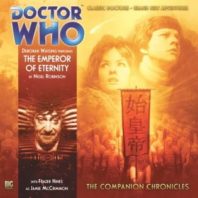
Released March 2010
With ‘The Suffering’ opening a new means of storytelling with The Companion Chronicles by providing two companions’ voices concurrently, Nigel Robinson’s ‘The Emperor of Eternity’ follows suit by having both Victoria and Jamie present to recount their unexpected visit to China in 200 B.C. following the TARDIS’s collision with an asteroid in space.
Discovering that a nearby village has been devastated as the TARDIS crew becomes suspected of being the rumoured barbarians who want to murder the first emperor Qin Shi Huang, this unique historical setting is certainly one rife with intrigue and danger. Unfortunately, everything that unfolds is utterly predictable with neither the supporting characters nor the leads really being allowed any time to shine. In a conventional tale that sees the Doctor taken away to the Imperial City, nothing that Victoria and Jamie do ultimately affects anyone or anything around them as they attempt to retrieve their friend, and the generic faces they come upon would be just as much at home in any other setting as they are here since the distinctiveness that this setting offers is all but forgotten except in name and a brief encounter with the terracotta army at the cliffhanger that ultimately falls completely flat.
That the story should disregard the more fascinating concept of the TARDIS being responsible for the destruction that occurred due to its collision with the meteor that was seen as an ill omen to instead focus on many tepid conversations of blame and suspicion is all the more disappointing. Jamie does get a nice bit of characterisation as he is able to look at the evidence before him and suggest that a passing monk might not be a monk after all, but although this is certainly not the first time that Jamie’s intuition has been disregarded, the tone of this scene comes off as harsher than it otherwise might even in this heightened environment. Unfortunately, the surprise ending that ties into this affair comes off as anything but since there is little attempt to obscure the truth or reliably deflect suspicions, and the whole affair becomes an exercise in the leads catching up to what the audience can rightfully assume to be true right from the start. With no attempt made to educate about the culture or customs of the time as well, the threadbare nature of the plot is sadly more pronounced than it otherwise would be and offers no glimpse of the immense ambition that this range has already reliably highlighted.
Although ‘The Emperor of Eternity’ does feature both Deborah Watling and Frazer Hines, the decision to put Hines into a much more secondary and supportive role is an odd one after the incredible outing that Maureen O’Brien and Peter Purves provided in the preceding story. This is not an affront to Watling in any way who blazes through the bevy of voices thrown in her direction and actually does quite well with Patrick Troughton’s stylings, but a greater use of that second voice could have helped to further differentiate those involved in these dangerous affairs of deceit and paranoia. Unfortunately, the performances and direction are not enough to compensate for the lengthy dialogue-driven scenes that fail to inspire any sense of imagination and awe, and ‘The Emperor of Eternity’ unfortunately fails to live up to its potential and provide any meaningfully memorable moments, the proper story ending several minutes before its runtime all too succinctly epitomizing the shortcomings of what should have been a captivating tale on all fronts.
- Release Date: 3/2010


Leave a Reply